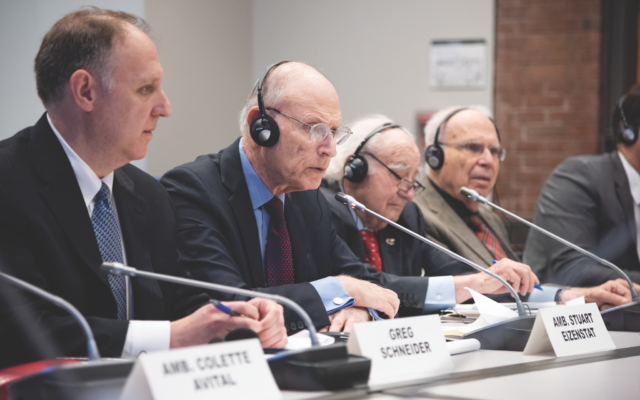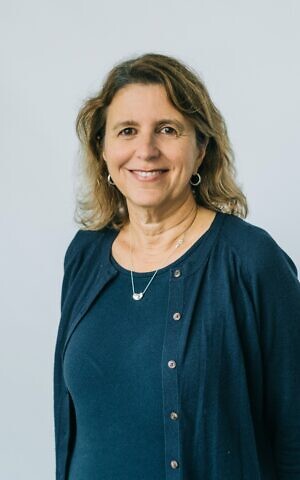U.S. Holocaust Survivor Count Dips to 50,000
The youngest survivors are now in their late 70s. More than one-third are estimated to live below the poverty line.
Dave Schechter is a veteran journalist whose career includes writing and producing reports from Israel and elsewhere in the Middle East.

EDITOR’S NOTE: For an update to this story, please click the following link: www.atlantajewishtimes.com/as-holocaust-survivors-dwindle-technology-steps-in/
A report to be issued this spring by The Conference on Jewish Material Claims Against Germany, the organization that annually negotiates with Germany for Holocaust reparations, will estimate that just 50,000 Holocaust survivors remain in the United States.
The report also will show that most of the survivors reside in New York, Florida and California, according to a spokesman for the agency, often referred to as the Claims Conference.
Jewish Family & Career Services estimates that more than 300 survivors live in Georgia, most in the Atlanta area, according to Amy Neuman, program manager of Holocaust Survivor Services, Aviv Older Adult Services for JF&CS.
The Claims Conference this year is allocating $2.1 million to support the myriad services that JF&CS provides for survivors in the Atlanta area, which include home care, house cleaning, meal delivery, transportation, medical equipment and adult daycare, along with help paying for medical and dental care and prescriptions.

JF&CS also will receive $1.9 million to pay home care claims in a 10-state region where it manages grant programs for the Claims Conference. The region is comprised of Georgia, South Carolina, North Carolina, Virginia, Alabama, Mississippi, Arkansas, Louisiana and sections of Florida and Texas.
Neuman said that JF&CS plans to increase its outreach to survivors from the Soviet Union, including through notices in Russian-language newspapers. Russia’s invasion of Ukraine may have the added effect of bringing forward survivors previously not on JF&CS’s client lists.
The Claims Conference announced March 2 that $720 million was being allocated to 300 social welfare organizations globally. In 2021, $653 million was allocated globally. JF&CS has been a recipient for a decade or more.
The Claims Conference was founded in 1951 by 23 major Jewish organizations following a promise by the then-West German government to make “material amends” to Jewish survivors of the Holocaust. Atlanta native Ambassador Stuart Eizenstat has been the Special Negotiator for the Claims Conference Negotiation Delegation since 2009. In a statement, Eizenstat said, “Our negotiations with the German Government are critical to the care and welfare of survivors and we are committed to continue to fight for the care of this final generation of survivors globally.”
The youngest survivors are now in their late 70s and nearly 60 percent are 85 and older.

Home care itself is a $1.7 million expense for JF&CS in Georgia alone; a similar amount is spent in the region. JF&CS also is supported through the Holocaust Survivors Support Fund of the Jewish Federation of Greater Atlanta. In fiscal year 2021, the Federation allocated $731,633 to JF&CS and $359,529 in fiscal year 2020. A more recent funding source is the KAVOD Survivors of the Holocaust Emergency Fund (SHEF) initiative, a program of the Seed the Dream Foundation in partnership with KAVOD-Ensuring Dignity for Survivors.
There is no official census of Holocaust survivors. A report by researchers in 2009 projected that in 2020 there would be 67,100 survivors in the U.S. and that this would decrease to 36,800 in 2025 and to 15,800 in 2030. Among its other findings was that around 37 percent of survivors are living below the U.S. government-established poverty line — a figure that has held steady in recent years.
That report was authored by Ron Miller, the associate director of the Berman Institute-North American Jewish Data Bank; Pearl Beck, director of evaluation for Ukeles Associates, Inc. and Berna Torr, an assistant professor of sociology at California State University-Fullerton.
There also is no official definition of what constitutes a Holocaust survivor. Yad Vashem, the Holocaust memorial and museum in Israel, refers to “Jews who lived for any amount of time under Nazi domination, direct or indirect, and survived. … From a larger perspective, other destitute Jewish refugees who escaped their countries fleeing the invading German army, including those who spent years and in many cases died deep in the Soviet Union, may also be considered Holocaust survivors.”
The United States Holocaust Memorial Museum in Washington, D.C. “honors as survivors any persons, Jewish or non-Jewish, who were displaced, persecuted, or discriminated against due to the racial, religious, ethnic, social and political policies of the Nazis and their collaborators between 1933 and 1945. In addition to former inmates of concentration camps, ghettos and prisons, this definition includes, among others, people who were refugees or were in hiding.”
JF&CS asks that anyone who knows of Holocaust survivors in Georgia needing assistance call 770-677-9382 and for those elsewhere in the region call 770-677-9360 or contact them through the website jfcsatl.org.
- News
- World
- Dave Schecter
- Jewish Family and Career Services
- The Conference on Jewish Material Claims Against German
- holocaust
- nazis
- World War II
- WWII
- Amy Neuman
- Holocaust Survivor Services
- Aviv Older Adult Services
- russia
- Ukraine
- Putin
- Ambassador Stuart Eizenstat
- Claims Conference Negotiation Delegation
- Holocaust Survivors Support Fund
- jewish federation of greater atlanta
- Seed the Dream Foundation
- Ron Miller
- Berman Institute-North American Jewish Data Bank
- Pearl Beck
- Yad Vashem
- United States Holocaust Memorial Museum
- Holocaust Survivors



comments